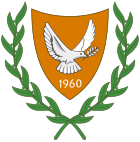
The Progressive Party of Working People is a Marxist–Leninist communist party in Cyprus.

Makarios III was a Greek Cypriot archbishop, primate, statesman and politician who served as the first President of Cyprus between 1960 and July 1974, with a second term between December 1974 and 1977. He was also the Archbishop of the autocephalous Church of Cyprus from 1950 to 1977.

Efstathios "Tassos" Nikolaou Papadopoulos was a Cypriot politician and barrister, who served as President of Cyprus from 2003 to 2008.

Glafcos Ioannou Clerides was a Cypriot statesman, who served as President of Cyprus in 1974 and from 1993 to 2003.

Spyros Achilleos Kyprianou was a Cypriot barrister and politician, who served as President of Cyprus from 1977 to 1988. He also served as President of the Cypriot House of Representatives from 1976 to 1977 and then again from 1996 to 2001, as well as being President of the Democratic Party, which he founded, from 1976 to 2000.

At the national level, the Republic of Cyprus holds elections for its head of state, the President of Cyprus, and for its legislature, the House of Representatives.

Cyprus was part of the British Empire, under military occupation from 1914 to 1925, and a Crown colony from 1925 to 1960. Cyprus became an independent nation in 1960.
The 1974 Cypriot coup d'état was a military coup d'état executed by the Cypriot National Guard and sponsored by the Greek military junta. On 15 July 1974 the coup plotters removed the sitting President of Cyprus, Archbishop Makarios III, from office and installed pro-Enosis nationalist Nikos Sampson. The Sampson regime was described as a puppet state, whose ultimate aim was the annexation of the island by Greece; in the short term, the coupists proclaimed the establishment of the "Hellenic Republic of Cyprus". The coup was viewed as illegal by the United Nations.
EOKA-B or Ethniki Organosis Kyprion Agoniston B was a Greek Cypriot paramilitary organisation formed in 1971 by General Georgios Grivas ("Digenis"). It followed an ultra right-wing nationalistic ideology and had the ultimate goal of achieving the enosis (union) of Cyprus with Greece. During its short history, the organisation's chief aim was to block any attempt to enforce upon the Cyprus people what the organisation considered to be an unacceptable settlement to the Cyprus issue. In addition, the organisation drafted various plans to overthrow President Makarios. The organisation continued its activities until it officially declared its dissolution and disbanded on 11 February 1978.

The House of Representatives is the national unicameral legislature of the Republic of Cyprus. Members and three observers representing Armenian, Latin, and Maronite Cypriots are elected by proportional representation every five years. 30% of seats are allocated to Turkish Cypriots, but these have been vacant since 1964. The House of Representatives of Cyprus is the only legislature in the European Union within a fully presidential system.

The London and Zürich Agreements for the constitution of Cyprus started with an agreement on 19 February 1959 in Lancaster House, London, between Turkey, Greece, the United Kingdom and Cypriot community leaders. On that basis, a constitution was drafted and agreed together with two prior Treaties of Alliance and Guarantee in Zürich on 11 February 1959.

Vassos Lyssarides was a Cypriot politician and physician who was a central figure in the politics of Cyprus after the island's independence.

The Constitution of Cyprus is a document, ratified on August 16, 1960, that serves as the Supreme Law of the Republic of Cyprus defining the system of government of the Cypriot Republic and the civil liberties for the Cypriot citizens. Cypriot government. It was drafted after the country won its independence in 1959 and is Cyprus's first and only constitution to date. The Constitution of the Republic of Cyprus has been in force for 64 years and it has been amended 18 (eighteen) times and 28 Articles of the 199 were modified since 1960. The 18th Amendment concerned Article 111.

Presidential elections were held in Cyprus for the first time on 13 December 1959. Only two candidates contested the election; Makarios III, who was backed by EOKA, and Ioannis Clerides, a member of the Democratic Union who was also supported by AKEL. The result was a victory for Makarios III, who received 67% of the vote, although he did not take office until 16 August 1960. Voter turnout was 91.2%.

Presidential elections were held in Cyprus on 25 February 1968. The result was a victory for the incumbent President Makarios III, who received 96% of the vote. Voter turnout was 93%.

Presidential elections were due to be held in Cyprus on 18 February 1973. However, as incumbent president Makarios III was the only candidate, the elections were not held and Makarios III was automatically declared the winner.

Presidential elections were due to be held in Cyprus in February 1978. However, after Vassos Lyssarides of the Movement for Social Democracy announced on 8 January that he would not stand as a candidate, incumbent president Spyros Kyprianou was left as the only remaining candidate. Kyprianou officially became president on 26 January.

The vice president of Cyprus is the second highest political position in Cyprus, after the president. Under the power-sharing Constitution of Cyprus, the vice presidency is reserved for a Turkish Cypriot, while the presidency conversely is reserved for a Greek Cypriot. However, ever since the 1974 Turkish invasion of Cyprus effectively created a separate Turkish Cypriot state, the position has been vacant, with the president of the Cypriot House of Representatives becoming the second-in-command.
Events in the year 1973 in Cyprus.
Events in the year 1960 in Cyprus.











